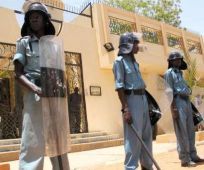Hundreds of Sudanese students protest France’s backing of UN resolution
By MOHAMED OSMAN, Associated Press Writer
KHARTOUM, Sudan, Apr 13, 2005 (AP) — Hundreds of students staged a sit-in outside the French Embassy on Wednesday, protesting France’s support for a U.N. resolution demanding international trials of war crime suspects in Sudan’s Darfur conflict.

|
|
Sudanese riot police stand guard outside the French Embassy during a student’s protest in Sudan’s capital Khartoum, April 13, 2005. (Reuters). |
The Sudanese government has sharply rejected handing over suspects for trial at the International Criminal Court, the world’s first permanent war crimes tribunal, as demanded by the Security Council in a resolution approved on April 1. France, a party to the ICC, submitted the original draft of the resolution.
“We call for chasing the French ambassador out,” the students shouted. About 300 protesters lined up across the road from the gates of the heavily guarded French embassy in Khartoum, carrying banners that read “No to neo-colonialism” and “no no for handing over.”
The sit-in was organized by Khartoum State Students Union, which is dominated by pro-government Islamists. Students came in trucks and buses — provided by the organizers– to the embassy, located in an affluent neighborhood about 20 kilometers (12 miles) from their dorms.
The students presented a letter to the embassy, asking France to “reconsider this shameful stance, correct it and openly apologize” to the Sudanese people, according to a French diplomat who read the memo to The Associated Press.
It said France’s backing of the resolution contradicts “the very principles of equality, brotherhood and justice, upon which the French republic is based, ” the memo said. The students left after two hours.
The U.N. Security Council resolution empowers the ICC to prosecute suspects in cases of alleged rape, murder and other atrocities in the conflict-torn Darfur, the scene of one of the world’s worst humanitarian crises. Pro-government militias have been blamed for most of the atrocities in the western region, where government forces have been fighting two rebel groups since February 2003.
An estimated 180,000 people have died in the upheaval — many from hunger and disease — and about 2 million others have been displaced.
The resolution was strongly opposed by the Sudanese government, which argues it is capable of bringing to justice those responsible for abuses in Darfur.
